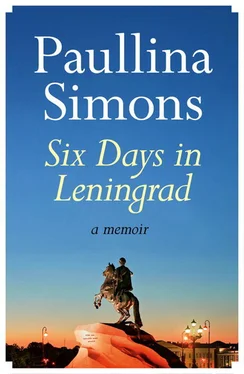Sitting again.
Before I left Russia Kevin told me that lightning had hit our Texas house, or near it, and knocked out our phone lines. Our babysitter instantly called our construction supervisor Phil. When our customer service contract expired with the builder what would we do without Phil at our beck and call?
Point was, I couldn’t call home; the phones weren’t working. It felt all wrong, that any part of our modern house should not function.
In Leningrad during the war, in December 1941, the authorities had to turn off the electricity. Russian winters are brutal and dark. Without light, the winter of 1941 must have been unbearable. The only thing that took people’s minds off the darkness from morning to night was the relentless hunger and impending death by starvation.
Every rat, every mouse, every dog and cat in the city had long been eaten. People sat in the dark and starved. That’s how it was. But every apartment had a little wood-burning ceramic stove, by which they could heat their small rooms, not quite seven meters for every man, woman and child.
The men were at war, the women and children were dying. If there was soup, they could have heated it up on the ceramic stove. There was no soup, and there was no firewood either. The Leningraders burned furniture and their clothes, they ripped apart abandoned homes in the villages to make firewood. Then they started cutting down trees in Leningrad. The city council by emergency decree protected the Summer Garden, but everything else was cut down and burned.
After the war, new trees were planted, but few. I walked through patches of Leningrad where there was no vegetation at all, like on the Neva embankment. There was only the wondrous river with its granite walls and the asphalt sidewalk. Nothing green. Now I knew why they had burned all the trees. To keep warm.
That’s what I needed. A little Russia. Every time I thought how hard it was to live without a phone for three days, I could think of Russia. We should all be so lucky as to carry a little Russia inside us in a box near our heart.
I stared out the window in LaGuardia, noticing that in the flat of green between one runway and the next the grass had been cut. Someone had paid for a mower and a person to cut the grass. Not a lot of money, just enough to get the grass cut. This fiduciary allocation was not superceded by air traffic control, or electricity or payroll. There was money left over to get the grass cut.
In Russia, there was no money at the grass level. And no money to fix the roads, to renovate the buildings, to clean up the Neva, to filter the water, to plant trees.
Or to fix the broken stucco on their walls, or get the garbage out of the courtyards of the Winter Palace or even polish the lions over the palace windows that didn’t face the street. Hell, there was not enough money to pay their own people or to replace the metal doors on their toilets.
The grass has never been cut in Shepelevo. Maybe the grass has never been cut in Sabinal, Texas, or Yazoo, Mississippi, but I doubt it. In any case, I didn’t grow up in Sabinal or Yazoo. I grew up in Leningrad, I grew up in Shepelevo, and I wish their grass were cut and their fences repaired, and their houses not held together by cardboard.
The sight of poverty — stucco falling off the walls, cracked glass panes, rotting window frames, loose doors, holes in the roads. People walking by the new stores with Western merchandise and having not a kopeek to buy the new mascara from Revlon, let alone Lancôme.
Gostiny Dvor, Leningrad’s premier shopping mall had never been renovated. Actually, that was not exactly true. The block that faced Nevsky Prospekt had indeed been repainted a delightful yellow. But as soon as you turned the corner on Mikhailovskaya, 80 years of Soviet rule faced you. Gostiny Dvor looked like an outdoor flea market in the poorest part of Tampa, Florida, but less clean.
Who was going to restore Gostiny Dvor?
Who was going to cut the grass in Shepelevo? And with what?
My sandpaper eyes hurt from being up, from reading, from being alive.
COMING HOME TO THE BLUE SILENCE
An uneventful American Airlines flight back to Dallas, a flight marked only by my ravenous hunger. The entire platter of Southwestern chicken plus two cookies was gone. I didn’t know how I kept myself from asking the woman next to me if she was going to eat her chicken.
She didn’t.
Kevin was supposed to pick me up at six in the evening by the gate with all the kids. I was waiting for the sign made by my daughter that said, “MOM.”
Not only was there no sign, there was no family either. I tottered over to the baggage claim, where I stood dejectedly for 15 minutes, until the luggage started coming out, and then my family appeared too. Apparently there was some confusion over scheduled arrival time. I was feeling so tired, I just wanted to be done with my day.
I was happy to see my husband and kids. We went to Rainforest Café for dinner.
My three year old son said, “Mom, do you know what we had for breakfast? Ice cream! And do you know what we had for lunch? Cookies! We had popcorn for dinner and we watched TV all day!” He laughed joyously.
Playing along, I furrowed my brow and turned to Kevin. “Dad!”
Smiling, Kevin shrugged his shoulders. “I don’t know where he gets this stuff.”
I didn’t know how I kept myself upright.
“So tell me about Russia,” Kevin said in the car on the way back home.
The thought of relating my Russia to Kevin in the car in between street lights filled me with tired dread. We were driving past McDonald’s, a Mobil station, a Boston Market. I tried.
The children interrupted us like a stutter as I rushed to tell him about Russia, staving off exhaustion and sorrow. I used the same words to discipline the children and the dogs. Russia through staccato sentences with no internal structure. “Shepelevo, border patrol, Misha stop yelling at your brother, give him the toy, Natasha stop whining, smell, poverty, wait I can’t hear myself talk you kids are screaming so loud, okay, Fifth Soviet, the toilets, Radik, Misha stop scratching the window with your rake, sit down, don’t take your seat belt off, okay if you kids don’t stop it, we’re turning right around, and there will be no Magic School Bus tomorrow. Kevin did you get that? Did you get what my Russia meant to me?”
We didn’t get home until ten in the evening, which was seven in the morning Leningrad time, which meant that I had been up for 24 hours less that hour nap next to the stubbly smoking inky artisté.
I don’t think I fell asleep as fell unconscious — detached and incongruous — around midnight.
The next morning we woke up at seven and exercised. My husband walked into our bathroom and found me gazing at our toilet.
“What are you doing?” he asked.
“Nothing. Look how nice it is.”
“What? The toilet?”
“I mean… well, yeah. Clean. And white. I’m so happy we didn’t get a black toilet.”
I felt Kevin staring at me. Turning around I said, “It’s just so clean, don’t you think?”
“Yeah… sure,” he said. “You want to go and look at the other five toilets?”
“I guess not,” I said. “Let’s go get our kids.”
We went to get our sons dressed and ready for the day. The babysitter came and Kevin went to work.
I trudged upstairs to my office. Phil the foreman called on the cell phone, because the regular phones still weren’t working. I had to call the phone company, and the alarm guy came to tell me that if lightning struck my house and ruptured the alarm signal, they would have to charge me $300 to fix it. Our home owner’s insurance was being cancelled, and the landlord from our old rental house hadn’t sent us our security deposit back. Kevin hadn’t listened to the phone messages the whole week I was gone, and there was one from my mother telling us that she was going in for gall bladder surgery and panicking, asking Kevin to please call her as soon as possible. Not only did he not call her, but my father hadn’t called her either. We were too busy dissecting the real estate situation in Schlisselburg to call my mother who was having gall bladder surgery.
Читать дальше












